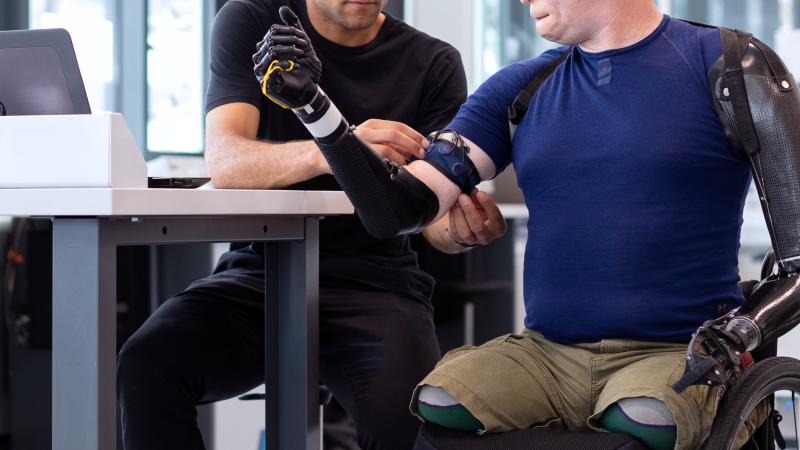A fashion model with prosthetic legs… a musician who can’t hear… a writer who can’t see. Instead of disabled, differently-abled, handicapped – why not better-abled?Read more
Episode Archives
Cameron Sinclair has something to say to architects out there: design like you give a damn. The founder of Architects for Humanity says the houses and office buildings we build today will literally shape the world our children inherit. So give a damn. In this hour of To the Best of Our...Read more
These days it seems we just can’t get enough of it. Over the past few years, luxury spending in the United States has been growing four times faster than overall spending. We’re spending more money on more products and services that we don’t really need – like Evian bottled water and Prada...Read more
Eighty per cent of Americans say they believe in heaven. But when they're asked to describe it, many are at a loss for words. Do they think that there's another universe in the sky or do they believe that heaven is something more abstract and metaphorical? We'll explore our enduring fascination...Read more
Nerds are an easy target for humor in movies and on TV... with their thick black glasses, hopelessly out-of-fashion clothes, and over-enunciated diction. But there's a dark side to nerds. In this hour of To the Best of Our Knowledge, we'll find out how the nerd stereotype is harming our children...Read more
What if our lives were like DVDs? What if we had alternative endings to look forward to, instead of death? We explore our lust for immortality. And we look at the many alternative endings that Ernest Hemingway wrote for his classic novel, "A Farewell to Arms."
In the history of near-fame experiences, one story stands out. Pete Best was the Beatles’ drummer just a few months before “Love Me Do” became a smash hit. His replacement, Ringo Starr, became a huge star. And Pete Best? He worked for decades as a civil servant in Liverpool. In this hour of...Read more
Do you believe in social progress and the power of networks to solve problems? Steven Johnson does. And he's coined a new term for himself and others like him -- the peer progressive movement. We'll learn all about it as we explore how digital networks are changing our lives.Read more
A rose is a rose is a rose... until it becomes perfume. In this hour of To the Best of Our Knowledge, the power of the flower. A science journalist introduces us to Luca Turin, the most amazing nose in the business, with a new theory about how we smell. We’ll talk with photographer Joyce...Read more
As artists and scientists explore the edges of our senses, what we touch, taste, see, smell, and hear is changing.
In this hour we hear from a psychiatrist who’s using touch to help people recover from trauma, investigate a mysterious sensory experience that gives some people euphoric...Read more
Investigative journalist Seymour Hersh made his name when he broke the story of the My Lai Massacre. Looking back you have to wonder: why did Lt. William Calley tell Hersh he’d killed hundreds of Vietnamese civilians? On this hour of To the Best of Our Knowledge Hersh says “because I asked him...Read more
With the emergence of barefoot running, the sport suddenly is red hot again. But barefoot or not, are human bodies really born to run? We'll check in on the science or runner's high this hour, and try to unlock the secrets of the Kenyans - the fastest people on earth. Also, Olympic medalist...Read more
Does anyone still hitchhike? Cult film director John Waters does. At the age of 66, he hitchhiked 2,800 miles, from Baltimore to San Francisco. He tells us about the people who picked him up, along with some who didn't. And did the America Interstate System pave the way...Read more
Jacques Derrida and the philosophical movement known as deconstruction were once the rage on college campuses. Those days have passed, but deconstruction's influence is everywhere. We talk with Gayatri Chakravorty Spivak, who first translated Derrida's landmark book "Of Grammatology" into...Read more
The pursuit of knowledge can make you do weird things. Sir Isaac Newton explored his eye-socket with a wooden stick. Swedish chemist Karl Scheele was undone by the toxic chemicals he insisted on tasting. And a German scientist named Becher spent years trying to make gold from his own urine,...Read more
If you ever find yourself on a dark country road in Ireland, bring along some salt, red thread, and a cross. That’s what you’ll need to protect yourself from “the other crowd.” Next time on To the Best of Our Knowledge, the fairies of Ireland. They’re magical, vengeful, and still alive and...Read more
Forget the deerstalker cap and the calabash pipe. The real Sherlock Holmes is much hipper than that. One scholar suggests that with his violin, creative spirit, cocaine and costumes, Holmes was the rock star of his day. We'll investigate the elementary Sherlock Holmes, from the new annotated...Read more
What’s the face of the future? Not flying cars and life on Mars… What’s the future of our faces? With new facial transplantation surgeries and the latest news about the NSA collecting images for facial recognition anaylsis, we're wondering about what we see in the mirror every day.
Also...Read more
Behold the spectacle of epic proportions! The abundant feast laid out! Tribes decked in battle attire!
Yes, friends. It's Super Bowl weekend, and have we got a show for you...Read more
Ingrid Betancourt was kidnapped by Marxist rebels in Columbia while in the midst of her presidential campaign. She spent the next six and a half years in captivity chained, humiliated and abused. But her greatest fear was not death. It was losing her humanity. In this hour of To the Best of Our...Read more
Novelist John Updike doesn’t like doing interviews. At least until the interview starts. Then he realizes it’s kind of flattering to talk about himself. Now, he’s written a novel about a famous artist being interviewed. In this hour of To the Best of Our Knowledge, John Updike on why an...Read more
Ben Franklin, Henry Ford, Abigail Adams, Elvis Presley. Know what they have in common? They're all on Daniel Wolff's list of great Americans. Wolff explains the unique ways those people learned what they had to know. We'll also take a hard look at IQ and its relationship to race and class, and...Read more
The atom bomb's ability to kill people makes it a literal dangerous idea. But there are other kinds of dangerous ideas -- ideas that are contrary, counterintutive and just plain unconventional. It's that kind of dangerous idea that we explore in this hour.Read more
Tariq Ramadan has been called the Muslim Martin Luther King, and he's often described as Europe's most important Muslim intellectual. Hundreds of young Muslims turn up at his talks, and tapes of his lectures are widely circulated. He travels throughout the Islamic world, trying to build...Read more



